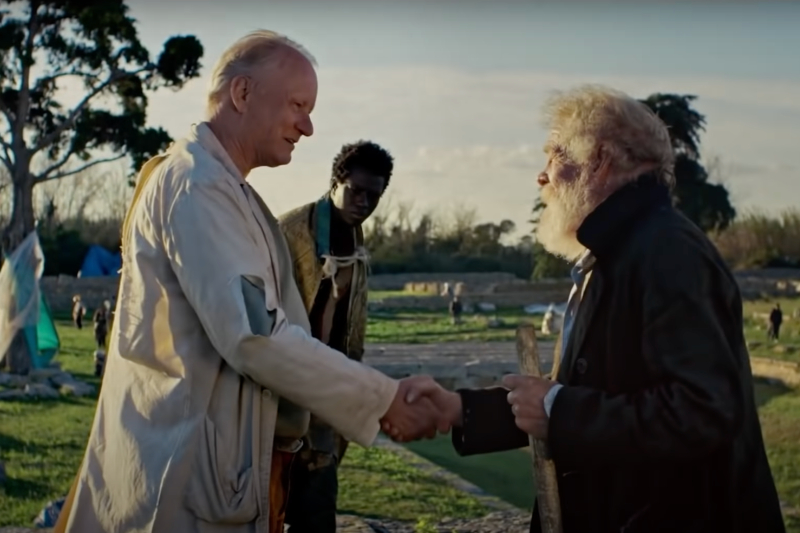
It is 2085. A young man looks on as two of the few survivors shake hands, a rare greeting in a desiccated human community.
“It’s been a long time since someone offered me his hand.”
The tearful laugh from Zyberski (Stellan Skarsgård) as he greets Shakespeare (Nick Nolte) says it all: this is a decimated place and an injured human race. In the preview for Last Words, from Gravitas Ventures, Kal (Kalipha Touray) embarks on a quest to find others and reestablish a human community after a series of apocalyptic tsunamis.
“Today is the 20th of June, 2086. Was I the last?” Kal asks in French as we watch his voyage through empty city streets.
Related Guides
The indie sci-fi drama follows two generations after Kal finds Shakespeare and, eventually, a struggling last human community in what was once Greece. The grizzled old guard introduces the young Kal to what the world once was through an enigmatic treasure.
“Do you understand what this is?” Shakespeare questions Kal.
The mysterious loot turns out to be multiple reels of film, all bearing the inscription “Cineteca di Bologna.” In the ruins of a cinemathèque, the group is able to hand crank a projection of these film strips, screening live theater upon a Doric-pillared temple.
The symbology is striking: The setting where in ancient times, theater first flourished, disclosing the intricate human drama from the stage. Culture arises again in this hallowed place, where people once again attempt to establish vibrant lives by imitating existence through art. Snippets from Greek and English plays unveil the ever-distinct and always inclusive spectacle of personal interaction. Even the title of the film fragments, “Cineteca di Bologna,” turns out to be a real-world location. The film archive in Bologna, Italy, founded on May 18, 1962, is one of the world’s largest film repositories.
Projecting these snippets provides renewed purpose for the older residents of this tiny tribe while the boy discovers the meaning of shared joy for the first time. Their journey to Athens is now spurred by a mission: Creating their own camera to capture humanity to reignite the richness of life.
Last Words is directed by Jonathan Nossiter, who also adapted the screenplay from Santiago Amigorena’s novel titled Mes derniers Mots (My Last Words). The Italian production was scheduled to premiere at the 2020 Cannes Film Festival premiere before the festival was canceled.
Last Words is now set to be released in theaters and on demand on Dec. 17. The film feels important, revealing why movies and a recording of our existence can be so integral. Entertainment brings people together and bonds them not just with the art of production, but in providing a record of our wildest dreams, harshest realities, and the emotions that move like waves between us.
Read More: Monstrous Mayhem Abounds in the Trailer for Death Valley



